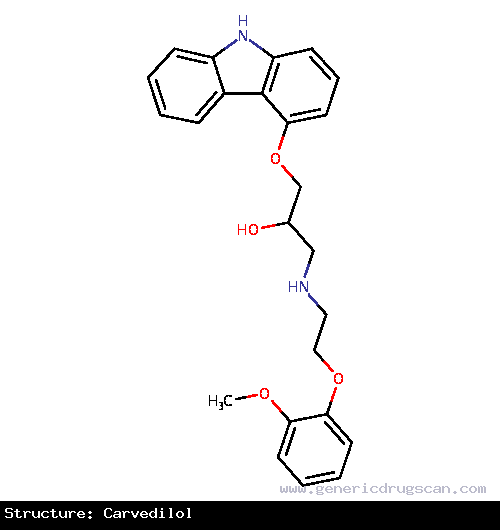Carvedilol Drug: Indication, Dosage, Precaution, Side Effect , Storage, Category Type and corresponding Brands - www.genericdrugscan.com
Carvedilol
Drug Status in USA : ApprovedDrug Status in Canada : Approved
pronunciation
pronounced as (kar' ve dil ol)
Why is this medication prescribed?
Carvedilol is used to treat heart failure (condition in which the heart cannot pump enough blood to all parts of the body) and high blood pressure. It also is used to treat people who have had a heart attack. Carvedilol is often used in combination with other medications. Carvedilol is in a class of medications called beta-blockers. It works by relaxing blood vessels and slowing heart rate to improve blood flow and decrease blood pressure
High blood pressure is a common condition and when not treated, can cause damage to the brain, heart, blood vessels, kidneys and other parts of the body. Damage to these organs may cause heart disease, a heart attack, heart failure, stroke, kidney failure, loss of vision, and other problems. In addition to taking medication, making lifestyle changes will also help to control your blood pressure. These changes include eating a diet that is low in fat and salt, maintaining a healthy weight, exercising at least 30 minutes most days, not smoking, and using alcohol in moderation.
How should this medicine be used?
Carvedilol comes as a tablet and an extended-release (long-acting) capsule to take by mouth. The tablet is usually taken twice a day with food. The extended-release capsule is usually taken once a day in the morning with food. Try to take carvedilol at around the same time(s) every day. Follow the directions on your prescription label carefully, and ask your doctor or pharmacist to explain any part you do not understand. Take carvedilol exactly as directed. Do not take more or less of it or take it more often than prescribed by your doctor.
Swallow the extended-release capsules whole. Do not chew or crush the capsules, and do not divide the beads inside a capsule into more than one dose. If you are unable to swallow the capsules, you may carefully open a capsule and sprinkle all of the beads it contains over a spoonful of cool or room temperature applesauce. Swallow the entire mixture immediately without chewing.
Your doctor will probably start you on a low dose of carvedilol and gradually increase your dose to allow your body to adjust to the medication. Talk to your doctor about how you feel and about any symptoms you experience during this time.
Carvedilol may help to control your condition but will not cure it. Continue taking carvedilol even if you feel well. Do not stop taking carvedilol without talking to your doctor. If you suddenly stop taking carvedilol, you may experience serious heart problems such as severe chest pain, a heart attack, or an irregular heartbeat. Your doctor will probably want to decrease your dose gradually over 1 to 2 weeks. Your doctor will watch you carefully and will probably tell you to avoid physical activity during this time.
What are the precautions to be followed?
Before taking carvedilol,- tell your doctor and pharmacist if you have are allergic to carvedilol, any other medications, or any of the ingredients in carvedilol tablets and extended- release capsules. Ask your pharmacist for a list of the ingredients.
- tell your doctor and pharmacist what prescription and nonprescription medications, vitamins, herbal products, and nutritional supplements you are taking or plan to take. Be sure to mention any of the following: cimetidine; clonidine (Catapres, Kapvay, in Clorpres), cyclosporine (Gengraf, Neoral, Sandimmune); digoxin ( Lanoxin); diltiazem (Cardizem, Cartia, Dilacor, Taztia, Tiazac); epinephrine (Epipen); fluoxetine (Prozac, Sarafem, Selfemra, in Symbyax); insulin; oral medications for diabetes; monoamine oxidase inhibitors (MAOIs) such as isocarboxazid (Marplan), phenelzine (Nardil), tranylcypromine (Parnate), and selegiline (Eldepryl, Emsam, Zelapar); paroxetine (Brisdelle, Paxil); propafenone (Rythmol); quinidine; reserpine; rifampin (Rifadin, Rimactane, in Rifater, in Rifamate); and verapamil (Calan, Covera-HS, Verelan, in Tarka). Your doctor may need to change the doses of your medications or monitor you carefully for side effects.
- tell your doctor if you have or have ever had asthma or other breathing problems, a slow or irregular heartbeat, or liver disease. Your doctor may tell you not to take carvedilol.
- tell your doctor if you have or have ever had problems with blood flow in your feet or legs, diabetes or any other condition that causes you to have low blood sugar, hyperthyroidism (condition in which there is too much thyroid hormone in the body), low blood pressure, Prinzmetal's angina (chest pain that comes at rest with no obvious cause), or pheochromocytoma (a tumor that develops on a gland near the kidneys and may cause high blood pressure and fast heartbeat). Also tell your doctor if you have ever had a serious allergic reaction to a food or any other substance.
- tell your doctor if you are pregnant, plan to become pregnant, or are breast-feeding. If you become pregnant while taking carvedilol, call your doctor.
- if you are having surgery, including dental surgery, tell the doctor or dentist that you are taking carvedilol.
- you should know that this medication may make you feel tired, dizzy, or lightheaded, especially when you start taking carvedilol and when your dose is increased. Do not drive a car or operate machinery until you know how this medication affects you. Be especially careful during the first hour after you take the medication.
- do not drink any alcoholic drinks or take any prescription or nonprescription medications that contain alcohol for 2 hours before and 2 hours after you take carvedilol extended-release capsules. Ask your doctor or pharmacist if you do not know if a medication that you plan to take contains alcohol.
- you should know that carvedilol may cause dizziness, lightheadedness, and fainting, especially when you get up too quickly from a lying position. This is more common when you first start taking carvedilol. To avoid this problem, get out of bed slowly, resting your feet on the floor for a few minutes before standing up.
- if you wear contact lenses, your eyes may become dry during your treatment with carvedilol. Tell your doctor if this becomes bothersome.
What are possible side effects of this medication ?
Carvedilol may cause hyperglycemia (high blood sugar). Call your doctor immediately if you have any of the following symptoms of hyperglycemia:- extreme thirst
- frequent urination
- extreme hunger
- weakness
- blurred vision
- tiredness
- weakness
- lightheadedness
- dizziness
- headache
- diarrhea
- nausea
- vomiting
- vision changes
- joint pain
- difficulty falling asleep or staying asleep
- cough
- dry eyes
- numbness, burning, or tingling in the arms or legs
- fainting
- shortness of breath
- weight gain
- swelling of the arms, hands, feet, ankles, or lower legs
- chest pain
- slow or irregular heartbeat
- rash
- hives
- itching
- difficulty breathing and swallowing
Carvedilol may cause other side effects. Tell your doctor if you experience any unusual problems while you are taking this medication.
How to store the medication and dispose it of after its use later?
Keep this medication in the container it came in, tightly closed, and out of reach of children. Store it at room temperature and away from excess heat and moisture (not in the bathroom). Throw away any medication that is outdated or no longer needed. Talk to your pharmacist about the proper disposal of your medication.
Drug Category/Class
- Vasodilator Agents
- Adrenergic beta-Antagonists
- Beta Blocking Agents
- Alpha and Beta Blocking Agents
- Cytochrome P-450 CYP2C9 Inhibitors
- Cytochrome P-450 CYP2C9 Inducers
- Antihypertensive Agents
- Cardiovascular System
- Adrenergic alpha-1 Receptor Antagonists
- Cytochrome P-450 CYP1A2 Inhibitors
- Cytochrome P-450 CYP1A2 Inducers
- CYP2D6 Inducers
- CYP2D6 Inducers (strong)
- CYP2E1 Inhib
| Prescribed | For the treatment of mild or moderate (NYHA class II or III) heart failure of ischemic or cardiomyopathic origin. |
| Weight : | 406.4742 |
| Structure | Carvedilol |
 | |
| Formula | C24H26N2O4 |
Carvedilol has 99 Brands listed
Search Generic Drugs alphabetically
